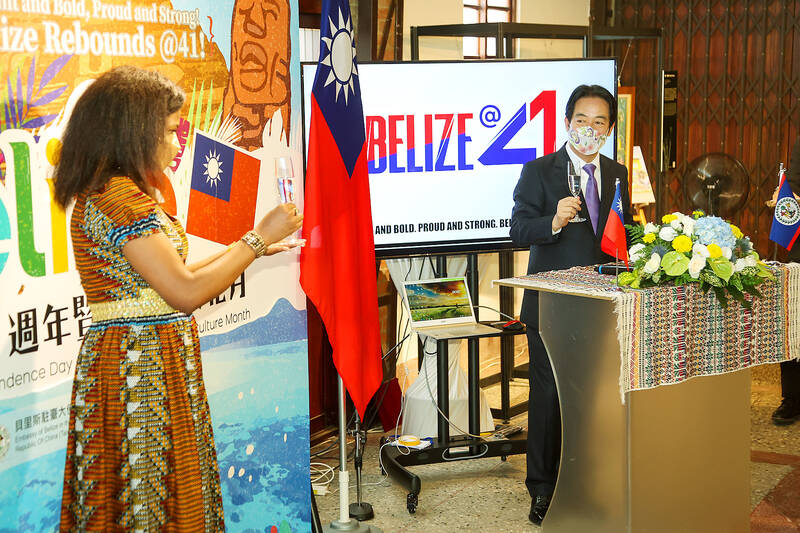Belize stands in solidarity with Ukraine and Taiwan, as both nations have encountered “aggression” from their neighbors, Belizean Prime Minister John Briceno said in a pre-recorded video yesterday.
“We stand in solidarity with Ukraine, as we do with Taiwan, which itself faces increased aggression from China,” Briceno said in the video, which was played at a ceremony in Taipei to mark the 41st anniversary of Belize’s independence.
The Central American nation achieved independence from the UK on Sept. 21, 1981.

Photo: CNA
“Dictatorial aggression” against Ukraine has not only resulted in the deaths of tens of thousands, but has also affected countries around the world, including Belize, Briceno said.
The Central American country supports Taiwan and Ukraine, because “we truly believe in the right to self-determination,” he added.
Belizean Ambassador to Taiwan Candice Augusta Pitts echoed the prime minister’s view, reaffirming at the event Belize’s “championing of Taiwan’s right to nationhood and self-determination.”
“Belize continues to advocate for Taiwan’s meaningful participation in the United Nations system,” the ambassador said while underlining the friendship and mutual support between the two nations in their 33 years of formal diplomatic relations.
Vice President William Lai (賴清德) thanked the Belizean government for its support for Taiwan when Taipei faces “growing threats” from Beijing, alluding to the increased military and economic pressure by China since a visit by US House of Representatives Speaker Nancy Pelosi early last month.
Despite facing these threats, the government would remain calm and rational, Lai said at the event, adding that it would never compromise the nation’s national sovereignty or democratic system.
Taiwan and Belize have enjoyed cordial relations over the past three decades through collaborations in such areas as public health, agriculture, education, information technology and environmental protection, Lai said.
In recent years, bilateral ties have further deepened, as Belize continues to support Taiwan’s inclusion in the World Health Assembly and other UN agencies, and Taiwan rolled out training programs for Belizean women, youth and small business owners, he said.
At the same time, trade and cultural exchanges have also expanded, Lai said, adding that bilateral trade saw a significant increase last year compared with 2020.
According to Customs Administration data, bilateral trade last year reached US$11.9 million, representing a year-on-year increase of 76 percent.
As part of the celebrations of Belize’s independence day, the Belizean embassy in Taiwan and the Central America Trade Office (CATO) on Tuesday last week launched Belize Culture Month at Bopiliao Historic Block in Taipei, featuring paintings, photographs and handicrafts created by Belizean artists, CATO said.
The event, which is to run until Sept. 25, also includes talks over the weekend, when experts will be invited to discuss Belize’s history, culture and cuisine, allowing local visitors to get a better understanding of Taiwan’s Central American ally, CATO said.

INVESTIGATION: The case is the latest instance of a DPP figure being implicated in an espionage network accused of allegedly leaking information to Chinese intelligence Democratic Progressive Party (DPP) member Ho Jen-chieh (何仁傑) was detained and held incommunicado yesterday on suspicion of spying for China during his tenure as assistant to then-minister of foreign affairs Joseph Wu (吳釗燮). The Taipei District Prosecutors’ Office said Ho was implicated during its investigation into alleged spying activities by former Presidential Office consultant Wu Shang-yu (吳尚雨). Prosecutors said there is reason to believe Ho breached the National Security Act (國家安全法) by leaking classified Ministry of Foreign Affairs information to Chinese intelligence. Following interrogation, prosecutors petitioned the Taipei District Court to detain Ho, citing concerns over potential collusion or tampering of evidence. The

‘FORM OF PROTEST’: The German Institute Taipei said it was ‘shocked’ to see Nazi symbolism used in connection with political aims as it condemned the incident Sung Chien-liang (宋建樑), who led efforts to recall Democratic Progressive Party (DPP) Legislator Lee Kun-cheng (李坤城), was released on bail of NT$80,000 yesterday amid an outcry over a Nazi armband he wore to questioning the night before. Sung arrived at the New Taipei City District Prosecutors’ Office for questioning in a recall petition forgery case on Tuesday night wearing a red armband bearing a swastika, carrying a copy of Adolf Hitler’s Mein Kampf and giving a Nazi salute. Sung left the building at 1:15am without the armband and apparently covering the book with a coat. This is a serious international scandal and Chinese

Seventy percent of middle and elementary schools now conduct English classes entirely in English, the Ministry of Education said, as it encourages schools nationwide to adopt this practice Minister of Education (MOE) Cheng Ying-yao (鄭英耀) is scheduled to present a report on the government’s bilingual education policy to the Legislative Yuan’s Education and Culture Committee today. The report would outline strategies aimed at expanding access to education, reducing regional disparities and improving talent cultivation. Implementation of bilingual education policies has varied across local governments, occasionally drawing public criticism. For example, some schools have required teachers of non-English subjects to pass English proficiency

TRADE: The premier pledged safeguards on ‘Made in Taiwan’ labeling, anti-dumping measures and stricter export controls to strengthen its position in trade talks Products labeled “made in Taiwan” must be genuinely made in Taiwan, Premier Cho Jung-tai (卓榮泰) said yesterday, vowing to enforce strict safeguards against “origin laundering” and initiate anti-dumping investigations to prevent China dumping its products in Taiwan. Cho made the remarks in a discussion session with representatives from industries in Kaohsiung. In response to the US government’s recent announcement of “reciprocal” tariffs on its trading partners, President William Lai (賴清德) and Cho last week began a series of consultations with industry leaders nationwide to gather feedback and address concerns. Taiwanese and US officials held a videoconference on Friday evening to discuss the